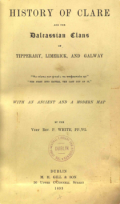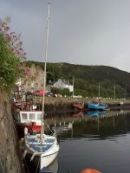Books I Have in my Library
If you are keen to order one of these books, please click on the advertisment which will take you to an Amazon listing of second-hand copies of the book at realistic prices.
Disclosure: We are a website that needs compensation to operate like any other website on the internet. We may receive consideration for our recommendations.
- Trace your Roots with DNA - Megan Smolenyak and Ann Turner 2004 Rodale
- Seven Daughters of Eve - Bryan Sykes 2001 Bantam Press
- Adam's Curse - Bryan Sykes 2003 Bantam Press
- In Search of the Double Helix - John Gribbin 1985 Corgi Books
- A Short History of Nearly Everything - Bill Bryson 2003 Black Swan
- The 10,000 Year Explosion: How Civilization Accelerated Human Evolution - Gregory Cochran 2009 Basic Books
- The Journey of Man - Spencer Wells 2002 Penguin Books
- DNA - James D Watson 2003 Knopf
- Biology - Jane B Reece - Neil A Campbell 1999 Benjamin Cummings
- Human Genetics - Concepts and Applications - Ricki Lewis 2005 McGraw-Hill
- In Search of Indo-Europeans - J P Mallory 1989 Thames & Hudson
- The Origins of the British - Stephen Oppenheimer 2006 Constable
- Irish Names and Surnames - Patrick Woulfe - 1906 M. H. Gill and Son
- Homo Britannicus - Chris Stringer 2006 Penguin Books
- Face of Britain - Robin McKie 2006 Simon & Schuster
- Human Instinct - Robert Winston 2002 Bantam Books
- Nature via Nurture - Matt Ridley 2003 Harper Perennial
- The Killers Within - Shnayerson & Plotkin 2003 Time Warner Books
- Good Germs Bad Germs - Jessica Synder Sachs 2007
- History of Clare and the Dalcassian Clans - Rev Peter White 1893 Google Books
Written by two of the country's top genealogists, this authoritative book is the first to explain how new and groundbreaking genetic testing can help you research your ancestry. DNA testing is just another tool to use in your search. After a brief introduction to genealogy and genetics fundamentals, the authors explain the types of testing available, what kind of information the tests can provide, how to interpret the results, and how the tests work. It's inexpensive, easy to do, and the results are accurate: It's as simple as swabbing the inside of your cheek and popping a sample in the mail. This book explains various Family stories and how DNA can help prove or disprove them. Testing can tell us whether two people of the same surname are from the same family. It can help detail ethnicity or whether someone was adopted. These are just a few of the types of genealogical scenarios readers can pursue. The authors reveal exactly what is possible-and what is not possible-with genetic testing. They include case studies of both famous historical mysteries and examples of ordinary folks whose exploration of genetic genealogy has enabled them to trace their roots.
The most popular book on European ancestry revealed through mitochondrial DNA. Although seven is a gross oversimplification, the book itself does provide a good introduction for the non-scientist. It traces the mtDNA of all European women back to seven sources and describes what life must have been like for them at the time each of these 'Daughters of Eve' was living.
A similar book to Seven Daughters of Eve, this time directed to the male of the species. A good introduction for the non-scientist.
A fascinating book that follows the progress of science from Darwin and Mendel then delves into the chemistry of DNA, amino acids and proteins and explains the workings of RNA, etc. An excellent primer for those with some science background. It is amazing how so much ground can be covered in such a small paperback.
This is a rough and very readable guide to science written in his quest to understand everything that has happened from the Big Bang to the rise of civilisation, and on to RNA and DNA. Packed with references to other papers.
What a great book this is. Where many think that man's evolution ceased when we left Africa, this book explains the changes in our genes that have evolved to cope with the move from hunter/gatherer to agriculturalist, to live in colder climes, to cope with various diseases. It explains that while mutations are frequent, only those that convey a benefit spread within a community. In some gene variations, one copy conveys a benefit while two can be disabling. Plenty of examples and a massive bibliography. Very readable and strongly recommended.
A broad perspective on how humans that originated in Africa eventually populated the whole world. This description is presented primarily derived from the perspective of the author's Y-chromosome DNA research.
The definitive book on the workings of the cell, by the man who discovered DNA. A good follow-on to In search of the Double Helix. Highly recommended
A heavy tome for those who need to know everything about the mechanics of RNA, DNA, ribosomes and so on. Excellent diagrams in this university textbook.
There are several editions of this work and Sixth or later are perfectly adequate. This is an excellent university text to learn all there is to know about cells, human reproduction, gene actions and gene therapy, diseases caused by mutations including cancers and their therapy. Easy to read and understand with questions/answers for each chapter. Highly recommended.
For those trying to understand how our language came about and its sources and influences. I found it a rather hard going discussing, as it does, all the ancient tribes of the Caucasus's, Balkans and near East.
Although controversial in spots, it provides a detailed description of his theory of the evolution of the modern human and their spread into Britain. Unfortunately, Oppenheimer uses some of his own naming conventions and they are hard to relate to the evolving standards. This is a sequel to The Real Eve and as its title suggests provides further details of the British ancestry to which so many of us relate. I really enjoyed this book.
Woulfe is one of the reference authors of Irish Names and Surnames that is cited by all those that followed him. This book is a scanned reprint of the 1906 original, but contains every page of the 100 in the original manuscript. This version is nowhere near as extensive as the 1923 edition which ran to 746 pages.
In this 1906 edition, Woulfe explains that it was written for the 'Gaelic League' to assist them with the Irish forms of their names and surnames. It explains the Gaelic names, the 'Sean-Ghaill' or Danish/Norwegian names from the 9th and 10th century and those that came into use in later centuries.
The first section describes how the original gaelic names are altered for male and female forms, nicknames and so on. Of interest to many is the anglicisation of surnames. The second section lists the English versions of christian names, both male and female, and Surnames, and then the original Gaelic form.
On Google books is a preview of the 1923 edition where the Introduction is well worth reading, together with the listing of every gaelic letter and its value (or sound). The preview can be found here.
This book presents the work of the Ancient Human Occupation of Britain project and looks at the evidence of occupation throughout the millennia, before and after the ice ages. It is looking at ancient peoples and not the recent (last 2000 years) waves of conquests. Again, no haplotypes here.
A light-weight accompaniment to the TV series of the same name. Based on The People of the British Isles project, it looks at the differences between people in various parts of Britain. The team required participants to be from a rural area in the defined region, and have all 4 grandparents born there. No haplotypes here though.
Tries to show were our instincts and emotions came from and how they were designed to help us to survive in primitive times.
The perennial debate - and it seems they are intrinsically inter-twined. While it talks of genes and how some interact, it does not help in our study of DNA for genealogical purposes.
Discusses the rise of antibiotic resistant bugs, caused by our overuse of antibiotics by prescription and in our food. Not a good read if you are about to enter hospital where it claims you are most likely to come into contact with these superbugs!
"Jessica Snyder Sachs's Good Germs Bad Germs is an outstanding introduction to a complex scientific topic, presented in extremely clear and vivid language. Her approach outlines not only the deleterious effects of microbes, with which we are all too familiar, but also the beneficial side to this vast array of organisms, without which human life would be impossible. The book is a must read for anyone who wants to get 'the big picture' of the microbial world." -Garland E. Allen, professor of biology, Washington University
"Jessica Snyder Sachs has a vital message about our future health: we have to get to know our microbes better. They are not simple germs to be wiped out with a magic drug,but complicated creatures whose existence is intimately intertwined with our own. In Good Germs, Bad Germs, Sachs delivers one of the best accounts of the cutting edge of microbiology I've read in recent years." -Carl Zimmer, author of Parasite Rex and Evolution: The Triumph of an Idea

This long out of print book is available as a free download from This Site.
This book from 1893 by Rev Peter White is an extensive history of Clare and of the origins and ancestry of the Dalcassian families. A large download, (116Mb) but an interesting and informative read.
Some wonderful books are available on Google Books for Free!!!
For those not aware, Google Books offers many books, in FULL, for free, while for others, short sections may be freely read. While they are mainly older books out of copyright, there are many that are quite interesting. For instance try the following for books on Dalcassian Genealogy.
Dalcassians Genealogy
Try entering other areas of interest in the search box. These books can be read on-line or downloaded to be printed out or read at your leisure.
Many Scientific Papers available from Ron Scott's site
There are many papers available in pdf format on matters such as y-DNA, mt-DNA, Population Movements and many other subjects at Ron Scott's site.


